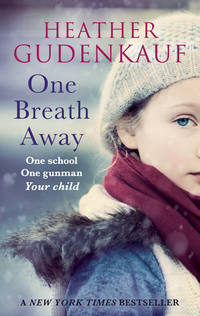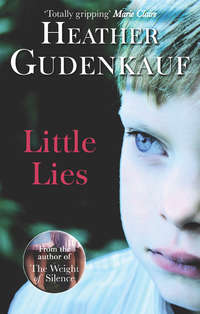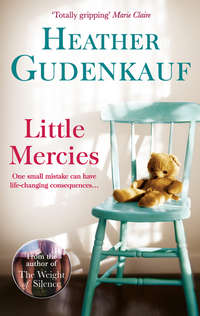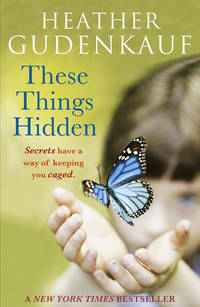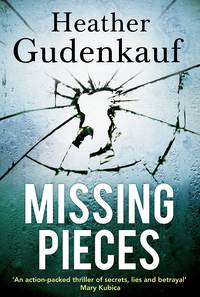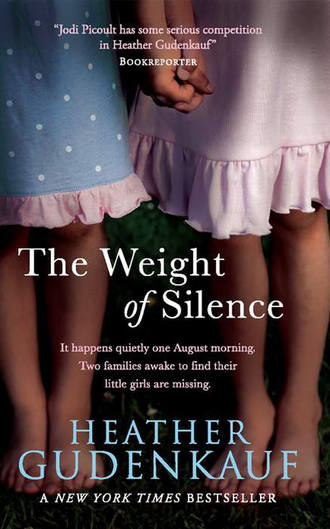
Полная версия
The Weight of Silence
“Never!” Ben yelled back. “You’ll have to feed us to the sharks before we surrender to the likes of you, Barnacle Bart!”
“So be it! Prepare ta swim wid da fishes!” Antonia bellowed, flourishing a stick.
“Run, Calli!” Ben screeched and Calli would. Her long pale legs shadowed with bruises from climbing trees and skirting fences, Calli would run until Antonia would double over, hands on her knees.
“Truce, truce!” Antonia would beg. The three of them would retreat to their willow hut and rest, sipping soda as the sweat cooled on their necks. Antonia’s laugh bubbled up from low in her chest, unfettered and joyous. She would toss her head back and close eyes that were just beginning to show the creases of age and disappointment. When Antonia laughed, those around her did, too, except for Calli. Calli hadn’t laughed for a long time. She smiled her sweet, close-lipped grin, but an actual giggle, which once was emitted freely and sounded of chimes, never came, though she knew her mother waited expectantly.
Antonia was the kind of mother who let you eat sugar cereal for Sunday supper and pizza for breakfast. She was the kind of mom who, on rainy nights, would declare it Spa Night and in a French accent welcome you to Toni’s House of Beauty. She would fill the old claw-foot bathtub full of warm, lilac-scented bubbles and then, after rubbing you dry with an oversize white towel, would paint your toenails Wicked Red, or mousse and gel your hair until it stood at attention in three-inch spikes.
Griff, on the other hand, was the kind of father who drank Bud Light for breakfast and dragged his seven-year-old daughter through the forest in a drunken search for his version of the truth. The sun beginning to rise, Griff sat the two of them down beneath one of the willow trees to rest.
MARTIN
I can feel Fielda’s face against my back, her arm wrapped around my ever-growing middle. It’s too hot to lie in this manner, but I don’t nudge her away from me. Even if I was in Dante’s Inferno, I could not push Fielda away from me. We have only been apart two instances since our marriage fourteen years ago and both times seemed too much for me to bear. The second time that Fielda and I were apart I do not speak about. The first separation was nine months after our wedding and I went to a conference on economics at the University of Chicago. I remember lying in the hotel on my lumpy bed with its stiff, scratchy comforter, wishing for Fielda. I felt weightless without her there, that without her arm thrown carelessly over me in sleep, I could just float away like milkweed on a random wind. After that lonely night I forewent the rest of my seminars and came home.
Fielda laughed at me for being homesick, but I know she was secretly pleased. She came to me late in my life, a young, brassy girl of eighteen. I was forty-two and wed to my job as a professor of economics at St. Gilianus College, a private college with an enrollment of twelve hundred students in Willow Creek. No, she was not a student; many have asked this question with a light, accusatory tone. I met Fielda Mourning when she was a waitress at her family’s café, Mourning Glory. On my way to the college each day I would stop in at the Mourning Glory for a cup of coffee and a muffin and to read my newspaper in a sun-drenched corner of the café. I remember Fielda, in those days, as being very solicitous and gracious to me, the coffee, piping hot, and the muffin sliced in half with sweet butter on the side. I must admit, I took this considerate service for granted, believing that Fielda treated all her patrons in this manner. It was not until one wintry morning, about a year after I started coming to the Mourning Glory, that Fielda stomped up to me, one hand on her ample hip, the other hand holding my cup of coffee.
“What,” Fielda shrilly aimed at me, “does a girl have to do in order to get your attention?” She banged the cup down in front of me, my glasses leaping on my nose in surprise, coffee sloshing all over the table.
Before I could splutter a response, she had retreated and then reappeared, this time with my muffin that she promptly tossed at me. It bounced off my chest, flaky crumbs of orange poppy seed clinging to my tie. Fielda ran from the café and her mother, a softer, more care-worn version of Fielda, sauntered up to me. Rolling her eyes heavenward, she sighed. “Go on out there and talk to her, Mr. Gregory. She’s been pining over you for months. Either put her out of her misery or ask her to marry you. I need to get some sleep at night.”
I did go out after Fielda and we were married a month later.
Lying there in our bed, the August morning already sweeping my skin with its prickly heat, I twist around, find Fielda’s slack cheek in the darkness and kiss it. I slide out of bed and out of the room. I stop at Petra’s door. It is slightly open and I can hear the whir of her fan. I gently push the door forward and step into her room, a place so full of little girl whimsy that it never fails to make me pause. The carefully arranged collections of pinecones, acorns, leaves, feathers and rocks all expertly excavated from our backyard at the edge of Willow Creek Woods. The baby dolls, stuffed dogs and bears all tucked lovingly under blankets fashioned from washcloths and arranged around her sleeping form. The little girl perfume, a combination of lavender-scented shampoo, green grass and perspiration that holds only the enzymes of the innocent, overwhelms me every time I cross this threshold. My eyes begin to adjust to the dark and I see that Petra is not in her bed. I am not alarmed; Petra often has bouts of insomnia and skulks downstairs to the living room to watch television.
I, too, go downstairs, but very quickly I know that Petra is not watching television. The house is quiet, no droning voices or canned laughter. I walk briskly through each room, switching on lights, the living room—no Petra. The dining room, the kitchen, the bathroom, my office—no Petra. Back through the kitchen down to the basement—no Petra. Rushing up the stairs to Fielda, I shake her awake.
“Petra’s not in her bed,” I gasp.
Fielda leaps from the bed and retraces the path I just followed, no Petra. I hurry out the back door and circle the house once, twice, three times. No Petra. Fielda and I meet back in the kitchen, and we look at one another helplessly. Fielda stifles a moan and dials the police.
We quickly pulled on clothes in order to make ourselves presentable to receive Deputy Sheriff Louis. Fielda continues to wander through each of the rooms, checking for Petra, looking through closets and under the stairs. “Maybe she went over to Calli’s house,” she says.
“At this time of the morning?” I ask. “What would possess her to do that? Maybe she was too hot and went outside to cool off and she lost track of time,” I add. “Sit down, you’re making me nervous. She is not in this house!” I say, louder than I should have. Fielda’s face crumples and I go to her. “I’m sorry,” I whisper, though her constant movement is making me nervous. “We’ll go make coffee for when he arrives.”
“Coffee? Coffee?” Fielda’s voice is shrill and she is looking at me incredulously. “Let’s just brew up some coffee so we can sit down and discuss how our daughter has disappeared. Disappeared right from her bedroom in the middle of the night! Would you like me to make him breakfast, too? Eggs over easy? Or maybe waffles. Martin, our child is missing. Missing!” Her tirade ends in whimpers and I pat her on the back. I am no consolation to her, I know.
There is a rap at the front door and we both look to see Deputy Sheriff Louis, tall and rangy, his blond hair falling into his serious blue eyes. We invite him into our home, this man almost half my age, closer to Fielda’s own, and sit him on our sofa.
“When did you see Petra last?” he asks us. I reach for Fielda’s hand and tell him all that we know.
ANTONIA
I am being lifted from my sleep by the low rumble of what I think at first is thunder and I smile, my eyes still closed. A rainstorm, cool, plump drops. I think that maybe I should wake Calli and Ben. They both would love to go stomp around in the rain, to rinse away this dry, hot summer, if just for a few moments. I reach my hand over to Griff’s side of the bed, empty and cooler than mine. It’s Thursday, the fishing trip. Griff went fishing with Roger, no thunder, a truck? I roll over to Griff’s side, absorb the brief coolness of the sheets and try to sleep, but continuous pounding, a solid banging on the front door, is sending vibrations through the floorboards. I swing my legs out of bed, irritated. It’s only six o’clock, for Christ’s sake. I pull on the shorts that I had dropped on the floor the night before and run my fingers through my bed-mussed hair. As I make my way through the hallway I see that Ben’s door is tightly shut, as it normally is. Ben’s room is his private fortress; I don’t even try to go in there anymore. The only people he invites in are his school friends and his sister, Calli. This is surprising to me. I grew up in a family of four brothers and they let me enter their domain only when I forced my way in.
My whole life has been circled by males; my brothers, my father, Louis and of course, Griff. Most of my friends in school were boys. My mother died when I was seventeen and even before that she hovered on the edge of our ring. I wish I had paid more attention to the way she did things. I have misty-edged memories of the way she sat, always in skirts, one leg crossed over the other, her brown hair pulled back in an elegant chignon. My mother could not get me into a dress, interested in makeup or sitting like a lady, but she insisted that I keep my hair long. I rebelled by putting my hair back in a ponytail and cramming a baseball hat on top of my head. I wish I had watched closely to the way she would carefully paint lipstick on her lips and spray just the right amount of perfume on her wrists. I remember her leaning in close to my father and whispering in his ear, making him smile, the way she could calm him with just a manicured hand on his arm. My own silent little girl is even more of a mystery to me, the way she likes her hair combed smooth after a bath, the joy she has in inspecting her nails after I have inexpertly painted them. Having a little girl has been like following an old treasure map with the important paths torn away. These days I sit and watch her carefully, studying her each movement and gesture. At least when she was speaking she could tell me what she wanted or needed; now I guess and falter and hope for the best. I go on as if there is nothing wrong with my Calli, as if she is a typical seven-year-old, that strangers do not discuss her in school offices, that neighbors don’t whisper behind their hands about the odd Clark girl.
The door to Calli’s room is open slightly, but the banging on the door is more insistent so I hurry down the steps, the warped wood creaking under my bare feet. I unlock the heavy oak front door to find Louis and Martin Gregory, Petra’s father, standing before me. The last time Louis was in my home was three years earlier, though I remember little of it, as I was lying nearly unconscious on my sofa after falling down the flight of stairs.
“Hi,” I say uncertainly, “what’s going on?”
“Toni,” begins Louis, “is Petra here?”
“No,” I reply and look at Martin. His face falls for a moment and then he raises his chin.
“May we speak with Calli? Petra seems to be…” Martin hesitates. “We can’t find Petra right now and thought that Calli could tell us where she might be.”
“Oh, my goodness, of course. Please come in.” I show them into our living room, now conscious of the scattering of beer cans on the coffee table. I quickly gather them and scurry to the kitchen to throw them away.
“I’ll just go and wake Calli up.” I take the stairs two at a time, my stomach sick for Martin and Fielda. I am calling, “Calli. Calli, get up, honey, I need to talk to you!” When I reach the hall, Ben opens his door. He is shirtless and I notice that his red hair needs trimming.
“Morning, Benny, they can’t find Petra.” I continue past him to Calli’s door and I push it open. Her bed is rumpled and her sock monkey lies on the floor, its smiling face turned toward me. I stop, puzzled, and then turn. “Ben, where’s Calli?”
He shrugs and retreats to his room. I quickly check the guestroom, my bedroom, Ben’s room. I rush down the stairs. “She’s gone, too!” I run past Louis and Martin, down our rickety basement steps, flipping on the light as I scurry downward, the cool dampness of our concrete basement sweeping over me. Only cobwebs and boxes. Our old, empty deep freeze. My heart skips a beat. You hear about this, children playing hide-and-seek in old refrigerators and freezers, not being able to get out once they are in. I told Griff time and again to get rid of the old thing. But he never did, I never did. Quickly I run over to the freezer and fling open the lid and a stale smell hits me. It’s empty. I try to regulate my breathing and I turn back to the steps. I see Martin and Louis waiting for me at the top. I sprint up the steps, past them and out the back door. I scan our wide backyard and run to the edge of the woods, peering into the shadowy trees. Winded, I make my way back to my home. Louis and Martin are waiting for me behind the screen door. “She’s not here.”
Louis’s face is stony, but Martin’s falls in disappointment.
“Well, they are most likely together and went off playing somewhere. Can you think of where they may have gone?” Louis inquires.
“The park? The school, maybe. But this early? What is it? Six o’clock?” I ask.
“Petra has been gone since at least four-thirty,” Martin says matter-of-factly. “Where would they go at such an early hour?”
“I don’t know, it doesn’t make sense,” I say. Louis asks me if he can have a look around, and I watch, following at his heels as he walks purposefully around my home, peeking in closets and under beds. She is not here.
“I’ve called in the information about Petra to all the officers. They’re already looking around town for her,” Louis explains. “It doesn’t appear that the girls were…” He pauses. “That the girls met any harm. I suggest you go look around for them in the places they usually go.” Martin looks uncertain about this plan, but nods his head and I do, too.
“Toni, Griff’s truck is outside. Is he here? Would he be able to tell us where the girls could be?”
Louis, in his kind way, is asking me if Griff is coherent this morning or if he is passed out in our bed from a night of drinking. “Griff’s not here. He went fishing with Roger this morning. He was going to leave at about three-thirty or so.”
“Could he have taken the girls fishing with him?” Martin asks hopefully.
“No,” I laugh. “The last thing Griff would do is take a couple of little girls on his big fishing trip. He’s not supposed to be back until Saturday. I’m positive the girls did not go fishing with him.”
“I don’t know, Toni. Maybe he did decide to take the girls with him. Maybe he left a note.”
“No, Louis. I’m sure he wouldn’t have done that.” I am beginning to become irritated with him.
“Okay, then,” Louis says. “We’ll talk again in one hour. If the girls aren’t found by then, we’ll make a different plan.”
I hear a rustle of movement and turn to see Ben sitting on the steps. At a quick glance he could be mistaken for Griff, with his broad shoulders and strawberry hair. Except for the eyes. Ben has soft, quiet eyes.
“Ben,” I say, “Calli and Petra went off somewhere and we need to find them. Where could they have gone?”
“The woods,” he says simply. “I’m going to go do my paper route. Then I’ll go look for them.”
“I’ll call to have some officers check out the woods near the backyard. One hour,” Louis says again. “We’ll talk in one hour.”
BEN
This morning I woke up real fast, my heart slamming against my chest. I was dreaming that stupid dream again. The one when you and me are climbing the old walnut tree in the woods. The one by Lone Tree Bridge. I’m boosting you up like I always do and you’re reaching up for a branch, your nail-bitten fingers white from holding on so tight. I’m crabbing at you to hurry up because I don’t have all day. You’re up and I’m watching from below. The climb is easier for you now; the branches are closer together, fat sturdy ones. You’re going higher and higher until I can only see your bony knees, then just your tennis shoes. I’m hollering up at you, “You’re too high, Calli, come back down! You’re gonna fall!” Then you’re gone. I can’t see you anymore. And I’m thinking, I am in so much trouble. Then I hear a voice calling down to me, “Climb on up, Ben! You gotta see this! Come on, Ben, come on!”
And I know it’s you yelling, even though I don’t know what you really sound like anymore. You keep yelling and yelling, and I can’t climb. I want to, but I can’t grab on to the lowest branch, it’s too high. I call back, “Wait for me! Wait for me! What do you see, Calli?” Then I woke up, all sweaty. But not the hot kind of sweaty, the cold kind that makes your head hurt and your stomach knot all up. I tried to go back to sleep, but I couldn’t.
Now you’ve gone off somewhere and somehow I feel guilty, like it’s my fault. You’re okay for a little sister, but a big responsibility. I always have to look after you. Do you remember when I was ten and you were five? Mom had us walk to the bus stop together. She said, “Look after Calli, Ben.” And I said okay, but I didn’t, not really, not at first.
I was starting fifth grade and I was much too cool to be babysitting a kindergartener. I held your hand to the end of our lane, just to the spot where Mom couldn’t see us from the kitchen window anymore. Then I shook my hand free from yours and ran as fast as I could to where the bus would pick us up. I made sure to look back and to check to see if you were still coming. I have to give you credit, your skinny kindergarten legs were running and your brand-new pink backpack was bouncing on your shoulders, but you couldn’t keep up. You tripped over that big old crack in the gutter in front of the Olson house, and you went crashing down.
I almost came back for you, I really did. But along came Raymond and I didn’t come back to you, I just didn’t. When you finally got to the bus stop, the bus was just pulling up and your knee was all bloody and the purple barrette that Mom put in your hair was dangling from one little piece of your hair. You budged right in front of all the kids in line for the bus to stand next to me and I pretended you weren’t even there. When we climbed on the bus, I sat down with Raymond. You just stood in the aisle, waiting for me to scootch over and make room for you, but I turned my back on you to talk to Raymond. The kids behind you started yelling, “hurry up” and “sit down,” so you finally slid into the seat across from me and Raymond. You were all nudged up to the window, your legs too short to reach the floor, a little river of blood running down your shin. You wouldn’t even look at me for the rest of the night. Even after supper, when I offered to tell you a story, you just shrugged your shoulders at me and left me sitting at the kitchen table all by myself.
I know I was pretty rotten to you that day, but on a guy’s first day of fifth grade first impressions are really important. I tried to make it up to you. In case you didn’t know, I was the one who put the Tootsie Rolls under your pillow that night. I’m sorry, not watching out for you those first few weeks of school. But you know all about that, being sorry and having no words to say something when you know you should but you just can’t.
CALLI
Griff sat with his back propped up against one of the aged willows, his head lolled forward, eyes closed, his powerful fingers still wrapped around Calli’s wrist. Calli squirmed uncomfortably on the hard, uneven ground beneath the willow. The stench of urine pricked at her nose and a wave of shame washed over her. She should run now, she thought. She was fast and knew every twist and turn of the woods; she could easily lose her father. She slowly tried to pull her arm from his clawlike clasp, but in his light sleep he grasped her even tighter. Calli’s shoulders slumped and she settled back against her side of the tree.
She liked to imagine what it would be like to stay out in the woods with no supplies, what her brother called “roughin’ it.” Ben knew everything about the Willow Creek Woods. He knew that the woods were over fourteen thousand acres big and extended into two counties. He told her that the forest was made up mostly of limestone and sandstone and was a part of the Paleozoic Plateau, which meant that glaciers had never moved through their part of Iowa. He also showed her where to find the red-shouldered hawk, an endangered bird that not even Ranger Phelps had seen before. She had only been out here a few hours and it was enough for her. Normally the woods were her favorite place to go, a quiet spot where she could think, wander and explore. She and Ben often pretended to set up camp here in Willow Wallow. Ben would lug a thermos of water and Calli would carry the snacks, bags of salty chips and thick ropes of licorice for them to munch on. Ben would arrange sticks and brushwood into a large circular pile and surround them with stones for their bonfire. They never actually lit a fire, but it was fun to pretend. They would stick marshmallows on the end of green twigs and “roast” them over their fire. Ben used to pull out his pocketknife and try to whittle utensils out of thin branches he would find on the ground. He had carved out two spoons and a fork before the blade had slipped and he sliced his hand, needing six stitches. Their mother had taken the knife away after that, saying he could have it back in a few years. Ben handed it over grudgingly. Lately, instead of carving out the silverware, she and Ben smuggled dishes and tableware from their own kitchen. Under the largest of the willows Ben had constructed a small little cupboard out of old boards and hammered it to the tree. They kept their household goods there. Once, trying to plan ahead, they had placed a box of crackers and a package of cookies on the shelf. When they returned a few days later, they found that something had been there before them, probably a raccoon, but Ben said, in a teasing voice, it also could have been a bear. Calli hadn’t really believed that, but it was fun to pretend that a mama bear was out there somewhere, feeding her cubs Chips Ahoy cookies and Wheat Thins.
She wondered if her mother had noticed that she was gone yet, wondered if she was worried about her, looking for her. Calli’s stomach rumbled and she hastily placed her free hand over it, willing it to silence. Maybe there was something to eat in the cupboard two trees over. Griff snorted, his eyes fluttered open and he settled his gaze on Calli’s face.
“You reek,” he said meanly, unaware of his own smell, a combination of liquor, perspiration and onions. “Come on, let’s get going. We’ve got a family reunion to attend. Which way do we go?”
Calli considered this. She could lie, lead him deeper into the forest, and then make a break for it when she had the chance, or she could show him the correct route and get it over with. The second choice prevailed. She was already hungry and tired, and she wanted to go home. She pointed a thin, grubby finger back the way they had come.
“Get up,” Griff commanded.
Calli scrambled to her feet, Griff let go of her arm and Calli tried to shake out the numbness that had snaked into her fingers. They walked in a strange sort of tandem, Griff directly behind her, his hand on her shoulder; Calli slumped slightly under the weight of his meaty hand. Calli led the two of them out of Willow Wallow about one hundred yards, to the beginning of a narrow winding trail called Broadleaf. Calli always knew if someone or something had been walking the trails before her. During the night spiders would knit their webs across the trails from limb to limb. When the morning sun was just right, Calli could see the delicate threads, a minute, fragile barrier to the inner workings of the forest. “Keep out,” it whispered. She would always skirt the woven curtain, trying not to disturb the netting. If the web dangled in wispy threads Calli knew that something had been there before her, and if closer inspection revealed the footprints of a human, she would retreat and wind her way back to another trail. Calli liked the idea that she could be the only person around for miles. That the white-speckled ground squirrel that sat on an old rotted tree branch, wringing his paws, would be seeing a human for the first time. That this sad-eyed creature before it didn’t quite belong, but didn’t disturb its world, either. Today she carefully stepped around a red maple, the breeze of her movements causing the web to sway precariously for a moment, and then settle.


